
Asian Journal of Organic Chemistry
Scope & Guideline
Inspiring the next generation of organic chemistry leaders.
Introduction
Aims and Scopes
- Synthetic Methodologies:
The journal showcases novel synthetic strategies, including multicomponent reactions, organocatalysis, and metal-catalyzed transformations, highlighting advancements in organic synthesis. - Catalysis:
Research on various catalytic systems, including transition metal, organocatalyst, and photocatalyst applications, is a focal point, with an emphasis on efficiency and sustainability in chemical processes. - Functionalization of Organic Compounds:
Papers often explore methods for the functionalization of organic molecules, including selective C-H activation and modifications of complex substrates to yield valuable derivatives. - Heterocyclic Chemistry:
The synthesis and application of heterocyclic compounds are prominent, addressing the development of new heterocycles and their derivatives with biological relevance. - Photochemistry and Photocatalysis:
The journal features studies on photochemical reactions and photocatalytic processes, showcasing the use of light in driving organic transformations. - Green Chemistry:
There is a consistent focus on environmentally friendly synthetic methods, including solvent-free reactions and the use of renewable resources in organic synthesis. - Molecular Design and Properties:
Research includes the design of new organic materials, such as sensors and luminescent compounds, often investigating their physical properties for applications in various fields.
Trending and Emerging
- Sustainable Chemistry:
An increasing number of articles focus on green chemistry and sustainable practices, emphasizing the use of renewable resources and environmentally friendly methodologies. - Photoredox Catalysis:
There is a notable rise in research involving photoredox catalysis, where light-driven reactions are harnessed for organic transformations, reflecting the growing interest in utilizing photochemical processes in synthetic chemistry. - Asymmetric Synthesis:
Emerging trends in asymmetric synthesis techniques, particularly using novel organocatalysts and chiral reagents, are increasingly prevalent, showcasing advancements in producing enantiomerically pure compounds. - Metal-Free Reactions:
Research on metal-free catalytic systems is gaining momentum, with a focus on developing efficient and sustainable synthetic routes without the need for traditional metal catalysts. - Functional Materials Development:
The journal is publishing more articles on the design and synthesis of functional materials with applications in electronics, sensors, and photonics, indicating a trend towards applied organic chemistry. - Bioconjugation and Drug Development:
There is a growing emphasis on bioconjugation techniques and the synthesis of bioactive compounds, particularly in the context of drug discovery and development.
Declining or Waning
- Traditional Organic Synthesis:
There seems to be a decreasing emphasis on classical organic synthesis techniques, with newer methodologies such as organocatalysis and photocatalysis gaining more traction. - Non-selective Reactions:
Papers focusing on non-selective or less efficient synthetic approaches are becoming less common, as the field trends towards more selective and efficient methods. - Synthesis of Simple Organic Molecules:
Research articles concentrating on the synthesis of simple organic compounds have diminished, likely as researchers seek more complex and functionally diverse molecules. - Conventional Analytical Techniques:
There appears to be a decline in studies solely reliant on traditional analytical methods, with a shift towards more integrated approaches that combine synthesis with advanced characterization techniques.
Similar Journals

INDIAN JOURNAL OF HETEROCYCLIC CHEMISTRY
Championing Excellence in Heterocyclic StudiesINDIAN JOURNAL OF HETEROCYCLIC CHEMISTRY, published by CONNECT JOURNALS, is a vital resource in the fields of organic chemistry and biochemistry, aiming to advance research and promote innovation within the realm of heterocyclic compounds. Established in 1996, this journal has successfully converged into an influential publication with a commitment to disseminating high-quality, peer-reviewed research articles that enhance the understanding of heterocyclic chemistry applications. Although it currently holds a Q4 quartile ranking in both biochemistry and organic chemistry according to the 2023 categorizations, its broader contributions to the scientific community should not be underestimated, as it seeks to support the ongoing dialogue among researchers, professionals, and students. The journal operates from Ghaziabad, India, providing open access to its publications, thereby fostering a collaborative and informative environment for its international readership. With an ISSN of 0971-1627 and a special focus on contemporary challenges and developments in the field, the INDIAN JOURNAL OF HETEROCYCLIC CHEMISTRY is poised to make a significant impact as it continues to evolve through 2024 and beyond.

ORGANIC SYNTHESES
Pioneering Discoveries in Organic SynthesisORGANIC SYNTHESES is a prestigious journal dedicated to the field of organic chemistry, published by ORGANIC SYNTHESES INC. Since its inception in 1946, the journal has served as a vital platform for researchers, educators, and practitioners in chemistry, showcasing significant findings and methodologies that advance the discipline. Although it currently does not offer open access, it is recognized for its rigorous peer-review process and its contribution to standardizing organic synthesis methods. With an ISSN of 0078-6209 and an E-ISSN of 2333-3553, the journal's impact reflects its quality, with a current Scopus ranking placing it in the fourth quartile in both Organic Chemistry and Physical and Theoretical Chemistry. This positioning underscores its critical role in fostering knowledge and innovation within these fields. Researchers and students alike will find ORGANIC SYNTHESES an essential resource for staying informed on contemporary practices and discoveries in organic synthesis.
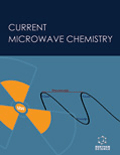
Current Microwave Chemistry
Pioneering Research in Microwave Chemistry for Tomorrow's SolutionsCurrent Microwave Chemistry is a pioneering academic journal dedicated to the dynamic and rapidly evolving field of microwave-assisted chemistry. Published by Bentham Science Publishers Ltd, this journal aims to disseminate high-quality research that explores innovative methodologies, novel applications, and the fundamental principles underlying microwave technology in chemical processes. Offering a platform for researchers, professionals, and students, Current Microwave Chemistry plays a crucial role in enhancing the understanding and application of microwave chemistry across disciplines such as synthetic chemistry, materials science, and pharmaceutical research. By facilitating open access to groundbreaking studies, this journal encourages collaboration and knowledge exchange, positioning itself as an essential resource for those looking to push the boundaries of what is achievable in chemical science.
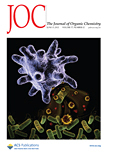
JOURNAL OF ORGANIC CHEMISTRY
Connecting Ideas and Innovations in Organic ChemistryJournal of Organic Chemistry, published by the American Chemical Society, is a prestigious peer-reviewed journal dedicated to advancing the field of organic chemistry. With an ISSN of 0022-3263 and an E-ISSN of 1520-6904, this journal has established itself as a key platform for disseminating high-quality research since its inception in 1936. Residing in the Q2 category for Organic Chemistry as of 2023, it ranks #64 out of 211 in Scopus, positioning itself within the top 69th percentile of its field. Researchers and professionals can access vital findings and innovative methodologies that drive the understanding and application of organic chemical principles. Although the journal is not open access, it remains a crucial resource in academia and industry, contributing significantly to the scientific community's knowledge base. For detailed insights and cutting-edge research, the journal continues to be an essential read for those engaged in the dynamic and evolving landscape of organic chemistry.
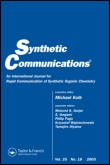
SYNTHETIC COMMUNICATIONS
Advancing the Art of Synthesis in Organic ChemistrySynthetic Communications, published by Taylor & Francis Inc, stands as a pivotal resource in the field of organic chemistry since its inception in 1971. With an ISSN of 0039-7911 and an E-ISSN of 1532-2432, this journal has established a commendable reputation, holding a Q3 ranking in organic chemistry by 2023, reflecting its contributions to the discipline and positioning it within the 50th percentile according to Scopus rankings. Targeted towards researchers, professionals, and students alike, Synthetic Communications aims to disseminate significant advancements in synthetic methodologies and reactions, facilitating the exchange of innovative ideas and enhancing collaborative efforts in the scientific community. Although not an open-access journal, it offers a wealth of valuable research content that is crucial for anyone dedicated to pushing the boundaries of organic chemistry.
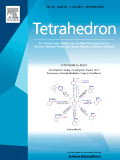
TETRAHEDRON
Advancing the frontiers of chemistry and biochemistry.TETRAHEDRON, published by Pergamon-Elsevier Science Ltd, is a leading peer-reviewed journal that has been pivotal in advancing the fields of Biochemistry, Drug Discovery, and Organic Chemistry since its inception in 1957. With an ISSN of 0040-4020 and an E-ISSN of 1464-5416, this journal provides a platform for the dissemination of cutting-edge research and innovative methodologies that contribute significantly to the scientific community. Recognized for its rigorous editorial standards, TETRAHEDRON has been categorized in the Q3 quartile for 2023 across its relevant fields, reflecting its solid impact within the scientific sphere. Despite the current absence of Open Access options, the journal continues to engage a diverse readership, offering invaluable insights and advancements that fuel both academic and industrial applications. With an ongoing commitment to excellence, TETRAHEDRON remains an essential resource for researchers, professionals, and students aiming to stay at the forefront of chemistry and biochemistry research.
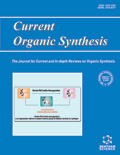
CURRENT ORGANIC SYNTHESIS
Bridging Theory and Practice in Organic SynthesisCURRENT ORGANIC SYNTHESIS, published by Bentham Science Publishers Ltd, is a leading journal in the field of organic chemistry and biochemistry that serves as a vital platform for researchers and professionals advancing the synthesis of organic compounds. With an ISSN of 1570-1794 and an E-ISSN of 1875-6271, it boasts a significant impact within its category, ranked in the Q3 quartile for both biochemistry and organic chemistry as of 2023. The journal covers innovative research and reviews that enhance our understanding of organic synthesis methodologies, showcasing contributions that advance the field. Operating from Sharjah, United Arab Emirates, CURRENT ORGANIC SYNTHESIS has evolved since its inception in 2005, providing access to a wealth of information essential for students, professionals, and researchers alike. While it currently does not offer open access, the journal continues to maintain a strong community of scholars dedicated to fostering dialogue and innovation in the organic sciences.

ACS Organic & Inorganic Au
Exploring the Intersection of Organic and Inorganic ChemistryACS Organic & Inorganic Au, published by the American Chemical Society, stands as a premier open-access journal dedicated to advancing the fields of organic and inorganic chemistry. Since its inception in 2021, this journal has swiftly risen to prominence, achieving a commendable Q1 classification in Inorganic Chemistry, Organic Chemistry, and Physical and Theoretical Chemistry as of 2023. With an ISSN of 2694-247X, it provides a vital platform for researchers, professionals, and students to disseminate their findings and engage with cutting-edge work across converged disciplines. Operating from its headquarters in Washington, DC, ACS Organic & Inorganic Au is committed to fostering a collaborative research environment, encouraging rigorous peer review, and ensuring the wide accessibility of high-quality scholarly articles. With its open-access model, readers worldwide can freely access and utilize research findings, promoting a global exchange of knowledge crucial for driving innovation in chemistry.
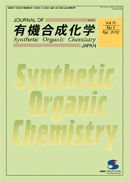
JOURNAL OF SYNTHETIC ORGANIC CHEMISTRY JAPAN
Pioneering research in the heart of organic synthesis.JOURNAL OF SYNTHETIC ORGANIC CHEMISTRY JAPAN, published by the SOCIETY OF SYNTHETIC ORGANIC CHEMISTRY, JAPAN, is an esteemed publication specializing in the dynamic field of organic chemistry. With a rich history dating back to 1944, this journal aims to disseminate pivotal research findings and innovative methodologies in synthetic organic chemistry, fostering collaboration and knowledge exchange among researchers and professionals. Although it currently holds a modest ranking in the Q4 quartile for organic chemistry, its commitment to advancing the discipline remains steadfast. The journal primarily caters to scholars and students seeking to delve deeper into organic synthesis, highlighting original articles, reviews, and methodological studies. While access to the journal is not open, its contributions to the field are essential for anyone invested in understanding the complexities of organic chemistry. We invite you to explore the journal's offerings and enhance your expertise in synthetic organic processes.
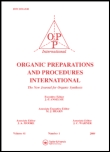
ORGANIC PREPARATIONS AND PROCEDURES INTERNATIONAL
Catalyzing Discoveries in Organic Chemistry Since 1971ORGANIC PREPARATIONS AND PROCEDURES INTERNATIONAL is a prominent journal in the field of organic chemistry, published by Taylor & Francis Inc. With an ISSN of 0030-4948 and an E-ISSN of 1945-5453, this journal has been a vital resource for researchers since its inception in 1971, showcasing a broad range of methodologies, protocols, and innovative applications within organic synthesis. Although categorized in the Q4 quartile for organic chemistry, the journal provides a critical platform for researchers at all levels to disseminate their findings and to access a wealth of practical organic procedures. It currently ranks #151 out of 211 in the Scopus Organic Chemistry category, underscoring its role in advancing the discipline despite its relatively modest impact factor. The journal offers a diverse collection of scholarly articles that are essential for both professional chemists and students, enriching their understanding of organic preparation techniques. Inviting contributions that encompass the full spectrum of organic synthesis, this journal serves as a valuable conduit for knowledge exchange in the ever-evolving field of organic chemistry.